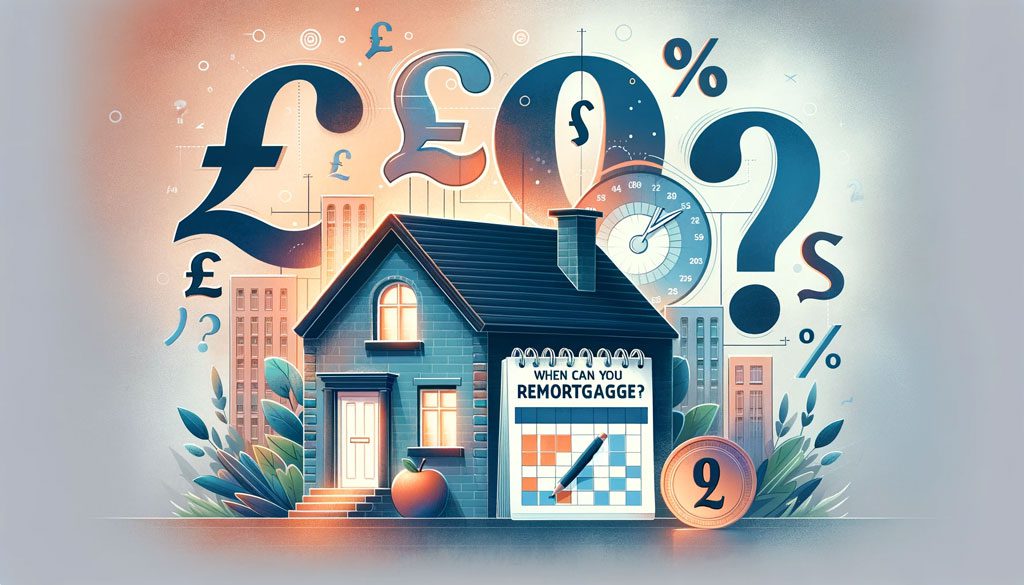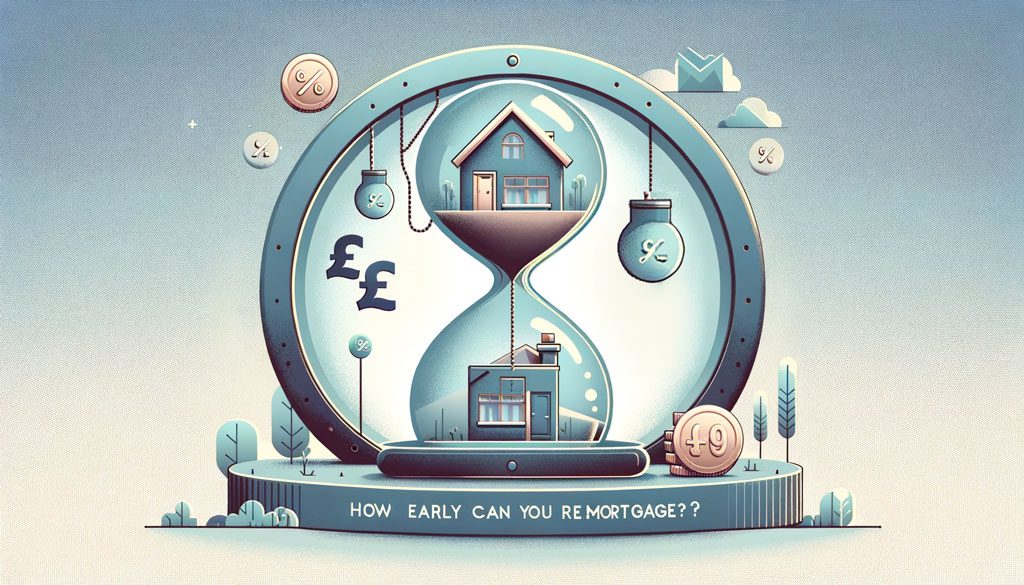Are you nearing the end of your mortgage’s fixed-rate period and wondering if it’s time to remortgage? The answer to how soon you should start the remortgage process isn’t a simple one, as there are many factors that come into play; from what your existing terms look like to how financially sound you currently are and even which lender policies may apply.
Remortgaging before your fixed rate ends may be beneficial, but it’s essential to consider all potential costs involved with refinancing such as early repayment fees and exit charges, which depend on how long is left on your current deal. It is recommended to start the remortgage process six months before your fixed rate mortgage ends; however, anytime prior to that is possible.
In our detailed guide, you will discover the full process of remortgaging before your fixed-rate period ends. We’ll discuss the benefits and drawbacks, what factors to take into account, plus all the steps necessary for a successful outcome. Whether you’re seeking out a reduced interest rate or wanting to access equity in your home or consolidate debt – understanding how it works is essential when deciding if this option is right for you.
When Can You Remortgage?
You’re free to remortgage whenever you wish, but it’s important to ensure it benefits you over the long term. The ideal time to consider remortgaging is typically around 3 to 6 months before your current mortgage deal expires. The ideal timing is when there’s a clear advantage in switching your mortgage over to a new deal. Often, this is when you’re nearing the end of a fixed-rate mortgage deal. This period allows you to explore options without rushing into a decision.

However, it’s not just about counting down to a date. The decision to remortgage also hinges on other key factors such as fluctuations in market interest rates, the equity you’ve built up in your property, and any significant changes in your personal financial circumstances. These elements collectively shape the landscape, indicating whether it might be beneficial to remortgage earlier or wait until your current deal concludes.
Can You Remortgage Early?
Wondering “Can I remortgage early?”. The answer is yes, it’s certainly possible to remortgage before your current deal ends. This move can be financially savvy, especially if you’re eyeing a better rate or different mortgage terms. However, it’s not without its caveats – there might be early repayment charges or other fees. So, it’s crucial to weigh the potential savings against these costs. Always do your homework, perhaps consult a financial advisor, to ensure this step aligns with your long-term financial strategy. In essence, early remortgaging can be a smart choice, provided it’s done with careful consideration of all implications.
Why you might decide to remortgage early
If you want to reduce your monthly mortgage repayments or invest in a new property, remortgaging might be worth considering. Especially if you’ve found a more attractive mortgage product with an improved rate than what you currently have. Additionally, if the value of your buy-to-let property has increased and you would like to borrow money against it for another investment opportunity; then this may also demonstrate the benefit of switching early from your current fixed-rate deal.
Can you remortgage early on a fixed rate?
Absolutely, you can remortgage early on a fixed-rate mortgage with no legal limitations. However, it’s necessary to be mindful of potential associated costs like an exit fee and early repayment charge which may apply. It is recommended that you review all the details before deciding if this is the right course of action for you. Remortgaging may be less attractive if these fees become too expensive, depending on the length of your fixed rate. Ultimately, whether it is beneficial to remortgage early or not depends heavily on personal circumstances and should only be done after carefully considering all relevant factors associated with it.
How Early Can You Remortgage?
Most remortgage offers stay effective for three to six months after being offered. So, if your current mortgage deal has up to six months left, you can already start the process for your new mortgage, securing your new rate ahead of time. Figuring out when to remortgage isn’t just about the numbers; it’s about smartly juggling your current mortgage, market trends, and your personal finance changes. Timing this right could mean big savings and better mortgage terms. Let’s unpack when you should think about remortgaging, considering different timeframes before your current deal wraps up.


Remortgaging Before 6 Months:
Sometimes, jumping into remortgaging early makes perfect sense, especially if:
- Your property’s value has shot up, boosting your equity.
- Your financial situation’s looking brighter.
- Market rates are in your favour, dipping lower than your current deal.
But hold on, there are things to weigh up:
- Watch out for early repayment fees.
- How does remortgaging fit with your long-term financial plans?
- Is switching mortgages now really worth it?
Remortgaging 6-3 Months Before Your Deal Ends:
Three to 6 months before your deal ends is usually the goldilocks zone for remortgaging. It’s the prime time for:
- Scouting out and comparing mortgage options, without the clock ticking too loudly.
- Bagging the best mortgage deal possible.
- Getting all your financial ducks in a row – documents, property valuation, the works.
Keep these in mind though:
- Stay savvy about where the market’s heading.
- How does your current mortgage stack up against the new mortgage offers?
- Make sure all your paperwork is ready for action.
Remortgaging Under 3 Months:
If your deal’s end is just around the corner, it’s time to:
- Dodge the high Standard Variable Rate bullet.
- Discover your best mortgage deals on offer by the lenders.
- Contact a broker to help make your application process slick and quick.
But remember:
- You might not have as much time to shop for the best deal.
- Rushing shouldn’t mean settling for a less-than-great deal.
- Ensure all your financial details and documents are spot-on and ready to go.
In any of these situations, getting a mortgage broker on your side can be a game-changer. Think of a broker as your personal guide through the remortgaging maze. They’ve got the know-how and the industry contacts to cut through the jargon and the paperwork, making the whole process smoother and quicker for you. With their help, you’re more likely to land a great deal without all the hassle and headaches.
Charges When Remortgaging Before the End of the Fixed Term
Are you thinking about leaving your fixed-rate mortgage early and remortgaging earlier than planned? It can be a tough decision, but with the right information, you can make an informed choice. A fixed-rate mortgage provides security by locking in interest rates over a set period of time so that you know exactly how much money needs to be paid each month – however, sometimes early termination of a current deal away from your existing deal may prove beneficial. On the other hand there are charges to think about called Early Repayment Charges. We provide examples below to assist with making such decisions!


How Much Early Repayment Charge When Remortgaging Early?
Deciding whether or not to remortgage before the end of a fixed-rate mortgage term is dependent on multiple components. One component to keep in mind while contemplating this decision is the Early Repayment Charge (ERC). This fee, which can be fairly high if you leave your current mortgage before its expiration date, typically calculates as a percentage of the remaining time left on that particular fixed rate process. Thus ERC’s are usually higher for mortgages with shorter terms.
Considering the potential cost savings from a new mortgage with lower interest, remortgaging before your fixed period ends could be an opportune decision. However, it may not be practical for everyone; those who have opted for shorter terms of two years or less usually choose to wait until their current fixed rate is over.
Remortgaging on a 2-Year Fixed Rate
Prior to deciding whether or not remortgaging before the conclusion of a fixed rate is ideal for you, it is important to be mindful of potential costs such as early repayment charge (ERC) and exit fee. An early repayment charge is often 5 – 1% of the remaining mortgage depending on your mortgage agreement with your current mortgage lender. Generally, ERCs are calculated based on how much longer your current fixed-rate mortgage has left until completion; thus, if you are close to finishing off a 2-year term then the fee may be higher than with one that runs for an extended timeframe.
To give an example, if your mortgage debt is £150,000 and you opt to remortgage six months into a two-year fixed rate term, it could cost you up to 2% of the total amount. In this case that would be £3,000! So make sure to consider potential early repayment charges before deciding on a new mortgage deal.
Remortgaging on a 5-Year Fixed Rate
When you finish remortgaging before the completion of a 5-year fixed rate term, it is similar to that of a 2-year fixed rate. In this instance, your ERC may be higher for the initial few years and then decrease as time progresses.
For example, if you opt to refinance six months into a 5-year term agreement period with an interest charge of 5% (5%, 4%, 3%, 2% and 1%), respectively), your Early Repayment Charge would total £7,500 on top of the mortgage being £150k.
Should I Remortgage Early?
While considering your individual finances and the associated costs and advantages, it is essential to determine if remortgaging prematurely would be a wise choice. If you think that obtaining a lower interest rate on your new loan will save more than what you’d spend for Early Repayment Charges or other fees, then possibly getting an early refinance could be advantageous. Ultimately though, make sure to contemplate each element before making any decisions.
Fees to Consider While Remortgaging
If you are considering remortgaging, there are a few fees that may come into play. These include:
- Early Repayment Charge (ERC): An early repayment fee is a penalty that you must pay if you decide to terminate your mortgage before the period ends. It’s usually calculated as a certain percentage of the remaining time left on your fixed-rate.
- Exit Fees: When you terminate your mortgage prematurely, regardless if it is within or after the designated Fixed payment period, you may be subject to a costly exit fee.
- Valuation Fees: Many lenders apply a fee to appraise the worth of your home, whereas others are willing to offer this service for free. This valuation can range considerably in expense – generally between £600 and £1,250.
- Arrangement Fees: Also known as a product fee, this charge relates to your current deal and can be added to the mortgage repayment amount or paid upfront. With either option, you are able to conveniently pay it off monthly in tandem with the borrowed sum.
- Broker Fees: If you enlist the aid of a mortgage broker or advisor, there may be an expense involved. Luckily, certain brokers such as YesCanDo offer their services free of charge; therefore, it is essential to confirm beforehand if any fees will be charged for using them.
How to Remortgage Before Your Fixed Rate Ends
If you are considering remortgaging before the end of your current deal, be sure to research and compare mortgage interest rates from various lending sources. Utilise comparison websites or contact lenders directly for their updated rate information. Additionally, confirm with your existing lender if there will be any fees involved in terminating early. With all the facts now at hand, you can determine whether remortgaging is a beneficial decision for you.
Wondering How long does a remortgage take?


Why Don’t People Usually Remortgage Early?
Remortgaging before your current mortgage deal ends is often done to secure a lower rate of interest, but this can be difficult if the market rates have increased since you secured your current mortgage deal. Even with if a lender offers you a lower interest rate, it may not be enough to make remortgaging early worthwhile. Something to always keep in mind is the cost of an Early Repayment Charge (ERC) and other fees that come along with remortgaging that could also have a impact on your finances – especially for shorter fixed-rate mortgages – making remortgage deals even more unattractive.
Remortgaging with the Same Lender
When you choose to remortgage with your existing lender, the process can be much simpler. Not only does it have all of your details on record and may remind you about available mortgage deals before the close of your current rate period, but some fees such as legal costs and valuation charges could also be circumvented. It is worth mentioning however that affordability assessments will likely still take place in case there have been a few years since taking out the original mortgage loan.
Remortgage Same Lender: A Comprehensive Decision-Making Guide
Remortgaging with a New Lender
If you’re dissatisfied with your existing lender’s rates, consider remortgaging to acquire a better deal. You have the option of conducting research and finding an ideal solution on your own or enlisting the help of a broker. There are additional expenses that come along with switching lenders (i.e., legal costs, broker fees), but some institutions offer digital mortgages which not only simplify this process but can save money as well!
How does remortgaging work? < Here is further information on the remortgage process.
Remortgaging with help from a mortgage broker such as YesCanDo Money
Ready to remortgage? At YesCanDo Money, we have an assortment of products for both our current customers and those looking to switch from their current mortgage lender. Our process is made easy with a multitude of options available – seek out a lower rate, borrow more capital or change your mortgage product altogether! The team at YesCanDo are here to field any queries you may have and guide you through the entire journey. With us, securing the right solution has never been simpler.


Conclusion
In essence, establishing if you should remortgage before your fixed-rate ends can be a difficult choice. Despite gaining access to to a new mortgage deal before the expiry date on your current fixed-rate deal, it is important that one takes into consideration various expenses such as early repayment charges and exit fees which may render prepayment undesirable, particularly in cases where you still have quite some time until the end of your term.
When deciding whether to remortgage your home, you must contemplate if that action would lead to monetary savings. This could be through a lower interest rate or accessing the equity in your house. If you do choose to go ahead and remortgage early, make sure that you browse for fixed-rate deals with the lowest rates available; also bear in mind any applicable fees or charges associated with it. Ultimately, this is an individual decision based on one’s financial objectives so take all considerations into account before proceeding further.
FAQs
Can I remortgage before my fixed rate ends?
Remortgaging before the fixed rate ends is an option. There’s nothing in legal terms that prevents you from leaving fixed rate mortgage early and seeking a different one. That said, it’s essential to take into account possible costs related to remortgaging, such as early repayment fees and exit charges which are contingent on how long you had initially locked down your mortgage for. If these prices are too steep, then remortgaging may not be worth considering at all. Ultimately, the choice to refinance your mortgage earlier than expected is a very personal one and must be weighed carefully against your own financial position as well as any potential advantages or disadvantages of doing so.
What is the earliest you can remortgage?
The earliest you can typically start the remortgaging process is around three to six months before your current deal ends.
When can I remortgage on a 5 year fixed mortgage?
You can start considering remortgaging in the final year of your 5-year fixed mortgage, ideally between the 4th and 5th year.
How early can I leave my fixed rate mortgage?
You can leave your fixed rate mortgage early, technically at any point, but be aware of early repayment charges and financial implications.
Is there a penalty for remortgaging early?
Yes, remortgaging early typically incurs a penalty, known as an early repayment charge (ERC). This charge varies depending on your mortgage terms.
Can I remortgage early without penalty?
Remortgaging early without penalty is possible if your mortgage terms allow it or during specific promotional periods offered by some lenders. Some lenders offer Mortgages with No Early Repayment Charges.
Is it worth remortgaging early?
Remortgaging early can be worth it if the long-term savings outweigh the costs, like early repayment charges. It requires careful financial assessment.
How long before you can remortgage your house?
You can usually start looking to remortgage your house three to six months before your current mortgage term ends.
When can I remortgage without penalty?
You can remortgage without penalty at the end of your fixed-rate period or when your mortgage terms allow it without early repayment charges.
Should I remortgage early or wait?
Deciding to remortgage early or wait depends on the potential savings, current interest rates, your financial situation, and any applicable early repayment charges.


